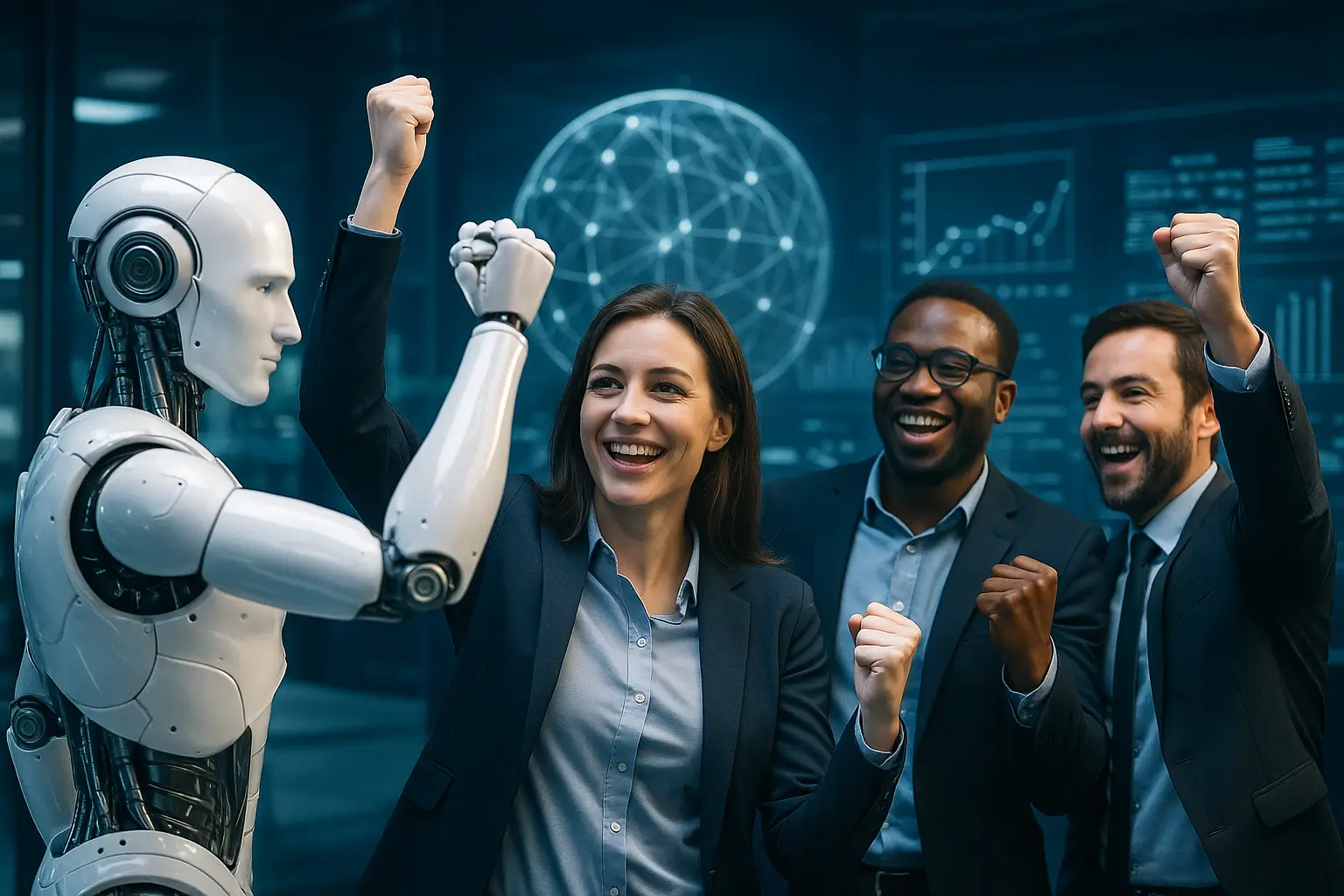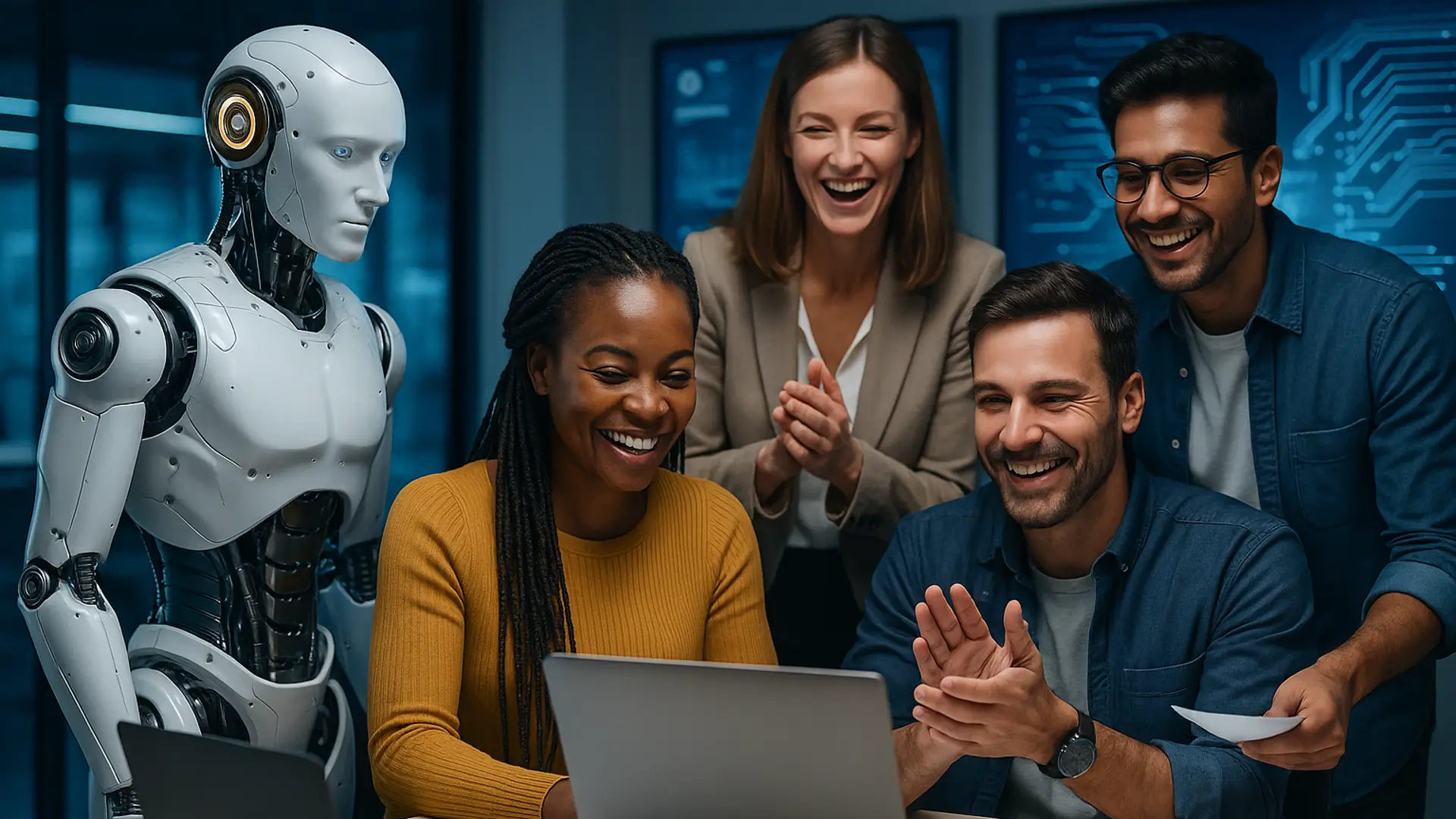For the past two decades, digital technologies have transformed how we work. What we’re experiencing today with artificial intelligence (AI), in 2025, isn’t just an evolution — it’s a disruption.
For a long time, information systems forced humans to perform repetitive, manual, often thankless tasks. These routines drained motivation, creativity — and meaning. Today, thanks to AI, we’re at a decisive turning point.
AI isn’t eliminating work — it’s redefining it
Contrary to popular belief, AI isn’t replacing humans — it’s freeing them. It automates low-value tasks, enhances decision-making, boosts creative capacity, and lets us focus on what makes us uniquely human: critical thinking, emotional intelligence, and human relationships.
La Harvard Business Review confirme que 60 % des emplois seront transformés, mais non supprimés. Ce ne sont pas les postes, mais les tâches qui évoluent : « L’IA modifie la structure interne des emplois bien plus qu’elle ne les élimine » (HBR, 2021).
Harvard Business Review confirms that 60% of jobs will be transformed, not eliminated. It’s not the roles but the tasks that are evolving: “AI changes the internal structure of jobs far more than it eliminates them.” (HBR, 2021).
“There are virtually no limits to automation when it’s well designed. Once AI delivers on its promise, we all stand to benefit — across every team: tech, finance, HR, customer service.”
— Benoît Lapointe, Chief Technology Officer, Rouge On Blue
More jobs — but different ones
According to Harvard Business Review, 85% of the jobs that will exist in 2030 don’t yet exist — and many will be tied to AI, algorithm oversight, and human-machine collaboration (HBR, 2024).
The Chicago Booth Review adds that AI-related investments are 28% more likely to create jobs than those in other technologies (Chicago Booth, 2025).
The World Economic Forum echoes this, predicting 97 million new jobs by the end of 2025, compared to 85 million that may be lost (WEF, 2024).
“What I see on the ground is that AI is eliminating boring tasks and giving us time back for what really matters: human relationships. It’s helping us reconnect with each other.”
— Hala Tazi, Director of Project and Business Analysis, Rouge On Blue
Creativity, unleashed and enhanced
Far from limiting imagination, AI is pushing the boundaries of creativity. It enables us to produce, prototype, and visualize — at unprecedented speed, scale, and cost.
“AI is removing the physical and budgetary constraints of creation. What we couldn’t produce yesterday in photography, video, or scenography is now within reach. We’re entering an era where creation is more personalized, more original — and more accessible.”
— Sébastien, Creative Director, Rouge On Blue
Platforms like DALL·E, Runway, Midjourney, and Adobe Firefly are already reinventing the work of designers, videographers, writers, and photographers. MIT Sloan Management Review confirms this trend: “AI isn’t replacing creators — it’s launching them into a new dimension.” (MIT Sloan, 2024)
Preparing organizations for the shift
In May 2025, The Economist noted that despite the rise of AI, employment rates in developed countries aren’t decreasing — they’re evolving (The Economist, 2025). So the real question isn’t “how many jobs?” but “how do we support this transition?”
“Being visionary means giving every team and every employee the support they need to test, understand, and embrace these new technologies. It means empowering them to transform their roles themselves — with AI as a co-pilot — so they can become more efficient, more creative, and more strategic.”
— Lionel, Strategist and Founder, Rouge On Blue
Rouge On Blue: Putting AI in the service of meaning
At Rouge On Blue, we believe digital transformation isn’t about tools — it’s about culture, structure, and people. That’s why we’ve embedded AI at the core of our digital transformation methodology and strategic planning approach.
We help organizations:
- map tasks that can be automated or augmented,
- identify AI levers tailored to their context,
- train teams in smart, practical use of these technologies,
- and most importantly, build a future of work that blends performance, creativity, and human fulfillment.

Must-read reference articles
- “Automation Doesn’t Just Create or Destroy Jobs — It Transforms Them”
Harvard Business Review — Novembre 2021
Author : Greg Satell
📎 Find out more - “AI Is Making Economists Rethink the Story of Automation”
Harvard Business Review — Mai 2024
Author : Ajay Agrawal, Avi Goldfarb, Joshua Gans
📎 Find out more - “Why AI hasn’t taken your job”
The Economist — 26 mai 2025
Author : The Economist staff
📎 Find out more - “A.I. Is Going to Disrupt the Labor Market. It Doesn’t Have to Destroy It.”
Chicago Booth Review — Avril 2025
Author : Hal Weitzman
📎 Find out more - “Why AI will not lead to a world without work”
World Economic Forum — Août 2024
Author : Saadia Zahidi (WEF)
📎 Find out more - “AI Creates Job Disruption But Not Job Destruction”
Forbes — 18 janvier 2022
Author : Adi Gaskell
📎 Find out more - “People are worried that AI will take everyone’s jobs. We’ve been here before”
MIT Technology Review — 27 janvier 2024
Author : David Rotman
📎 Find out more - “Will AI replace jobs? 18 job types that might be affected”
TechTarget — Février 2023
Author : Ben Lutkevich
📎 Find out more - “Why AI Will Create More Jobs Than It Will Eliminate”
Vic.ai blog — Juillet 2024
Author : Alexander Hagerup
📎 Find out more - “The Jobs That Artificial Intelligence Will Create”
MIT Sloan Management Review — Mars 2024
Author : Thomas H. Davenport & Steven Miller
📎 Find out more
